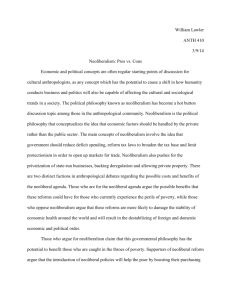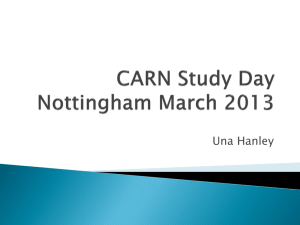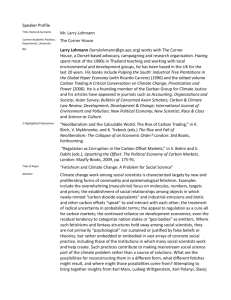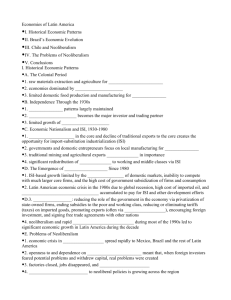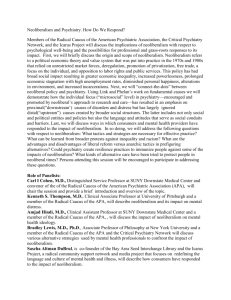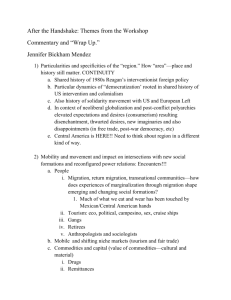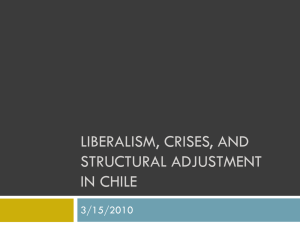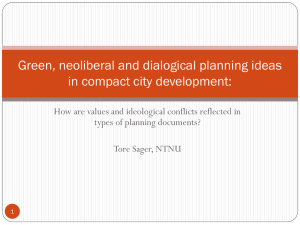The Political Economy of Post
advertisement
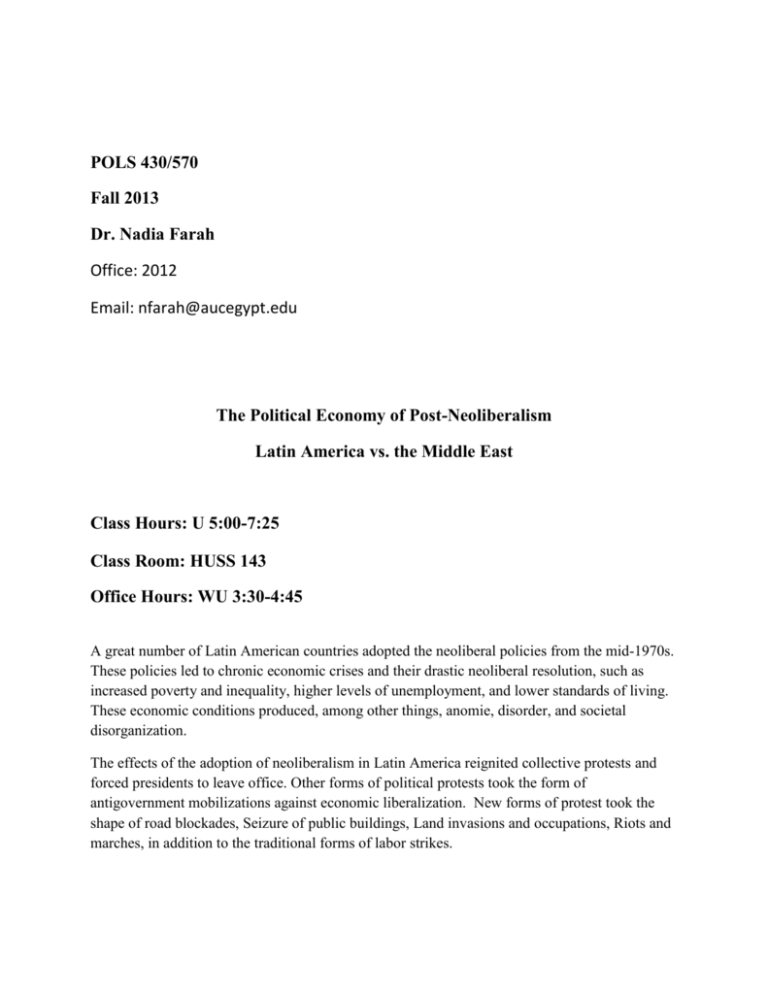
POLS 430/570 Fall 2013 Dr. Nadia Farah Office: 2012 Email: nfarah@aucegypt.edu The Political Economy of Post-Neoliberalism Latin America vs. the Middle East Class Hours: U 5:00-7:25 Class Room: HUSS 143 Office Hours: WU 3:30-4:45 A great number of Latin American countries adopted the neoliberal policies from the mid-1970s. These policies led to chronic economic crises and their drastic neoliberal resolution, such as increased poverty and inequality, higher levels of unemployment, and lower standards of living. These economic conditions produced, among other things, anomie, disorder, and societal disorganization. The effects of the adoption of neoliberalism in Latin America reignited collective protests and forced presidents to leave office. Other forms of political protests took the form of antigovernment mobilizations against economic liberalization. New forms of protest took the shape of road blockades, Seizure of public buildings, Land invasions and occupations, Riots and marches, in addition to the traditional forms of labor strikes. In the last decade, the neoliberal policies and the social and political protests led to the collapse of many Latin American regimes, such as Argentina economic collapse in 2001. A new policy frame emerged in many Latin American countries which relies more on state-led development and the adoption of social democracy. Social democracy is a redistributive system to decrease inequalities, reduce poverty and obtain the support of the groups which were marginalized and pauperized under the neoliberal policies. These policies are known as Neo-Populism. So how does the Latin American case relate to the Middle East and especially Egypt? The socalled Arab Spring was motivated in large part by the drastic neoliberal policies adopted by most Middle Eastern countries, especially Egypt and Tunisia. But the new regimes emerging in these countries are oblivious to the effects of neoliberalism and are following the same economic policies of the previous regimes. What is achieved in the Arab Spring countries is ironically the superimposition of political Islamism on the drastic economic policies followed by the deposed regimes. That is why political protest is continuing in the Arab Spring countries due to the failure of the current regimes to deal with the deep economic crises and the increasing inequalities ravaging the new democracies. In this course we aim at the study of Latin America experiments with the new policies that are targeting growth but also social equity. We also aim at formulating new economic policies for the Arab Spring countries especially Egypt that might resolve the deep economic crises ravaging the new regimes. CAN WE LAERN FROM LATIN AMERICA? COURSE REQUIREMENTS Participation Assignments Two Presentations or a book review Final Research Paper Last Week 10% 30% 30% 30% Class Policies 1. No one is to enter the classroom after the instructor 2. Cell phones are to be switched off 3. No taping of lectures 4. Cheating during written exams is heavily penalized. A student caught cheating will earn an F for the Whole course and will be referred to AUC Academic Integrity Committee. 5. Students are required to submit written assignments. Plagiarism is a serious academic offense. To avoid the suspicion of plagiarism, the instructor may ask students to present the rough work used in preparation and submit to an oral exam. If evidence of plagiarism is found, the student will automatically earn an F grade for the whole course and he/she will be referred to AUC Academic Integrity Committee. 6. Late assignments will be penalized by a subtraction of 5% of the grade for each day of the first week. No assignments will be accepted after the first week of determined date for submission and the student will earn an F grade on the assignment. 7. 10% of the grade of every written assignment will be based on “Adequacy of English Usage.” Readings & Schedule A CD including all the readings will be handed to each student at the beginning of the Class. Week 1: Introduction Week 2-5: Post Neoliberalism Roger Merino Acuña: What is “post” in post-neoliberal economic policy? Extractive industry dependence and indigenous land rights in Bolivia and Ecuador MoisésArce :The Repoliticization of Collective Action: After Neoliberalism in Peru; Sharon Beder: Global Financial Crisis; James K. Galbraith, Laura Spagnolo and Sergio Pinto: The Decline of Pay Inequality in Argentina and Brazil following the Crises and Retreat from the Neo-liberal Model ; James Galbraith and Sara Hsu: Trade Policy in the Post-Neoliberal Era ; UrsˇaGolob, Klement Podnar and Marko Lah: Social economy and social responsibility: alternatives to global anarchy of neoliberalism? Jean Grugel& Maria Pia Riggirozzi: The Return of the State in Argentina; Graham Harrison: Post-neoliberalism? Fadhel Kaboub: Elements of a Radical Counter-movement to Neoliberalism: Employment-led Development Cristobal Rovira Kalwasser:Moving Beyond the Washington Consensus: The Resurgence of the Left in Latin America David Kotz: Neoliberalism and the U.S.; Economic Expansion of the ’90s Simon Granovsky-Larsen: Upsetting Neoliberalism: The End of an Era in Latin America Minqi Li: After Neoliberalism: Empire, Social Democracy, or Socialism Yahya M. Madra & Fikret Adaman: Public economics after neoliberalism: a theoretical–historical perspective Ziyanis¸ and Fikret Senses: Rethinking the Emerging Post-Washington Consensus Thomas I. Palley: From Keynesianism to Neoliberalism: Shifting Paradigms in Economics James Petras : Latin America’s New Middle Class Rulers Gerardo Rénique: Introduction, Latin America today: The revolt against neoliberalism Pia Riggirozzi & Jean Grugel: Post Neoliberalism: Rebuilding and Reclaiming the State in Latin America Dani Rodrik: After Neoliberalism, What? Richard Sandbrook: Polanyi and Post-neoliberalismin the Global South: Dilemmasof Re-embedding the Economy Case Studies All the Readings for the Case Studies are included in the CD. Week 6: Argentina Paul Cooney. Argentina’s Quarter CenturyExperiment with Neoliberalism:From Dictatorship to Depression Rutherfelder & Viviana Patroni: Austerity and its Aftermath Neoliberalism and Labour in Argentina. Peter Ranis. Factories without Bosses: Argentina’s Experience with Worker-Run Enterprises. Pia Riggirozzi. After Neoliberalism Argentina: Reassesing Nationalism in an Open Economy Week 7: Bolivia Benjamin Kohl. Stabilizing neoliberalism in Bolivia: popular participation and privatization Robert R. Barr. Bolivia: Another Uncompleted Revolution. Raúl L. Madrid. The Rise of Ethno-Populism in Latin America: The Bolivian Case Jeffery R. Webber. From rebellion to reform Bolivia’s reconstituted neoliberalism. Håvard Haarstad & Vibeke Andersson. Backlash Reconsidered: Neoliberalism and Popular Mobilization in Bolivia. Week 8: Brazil Leslie Bethell.Populism in Brazil: from Getúlio to Lula. Luiz Carlos Bresser-Pereira.Populism and Economic Policy in Brazil Christine Kearney. The Poverty of Neoliberalism in Brazil: Economic Culture and Policy Choice. Francisco Panizza. Neopopulism and its limits in Collor's Brazil Armando Boito. Class Relations in Brazil's New Neoliberal Phase Peter Kingstone. Sobering Up and Going Global: Brazil’s Progress from Populism and Protectionism. Peter H. Ladner. Reinvention Without Replacement: The Role of Inertial Statism and Brazil’s Economic Bureaucracy in Maintaining an Active Developmental State Week 9: Venezuela Jonathan DiJohn. The Political Economy of Anti-Politics and Social Polarization in Venezuela, 1998-2004 Michael Dodson and Manochehr Dorraj. Neo-populism in Venezuela and Iran: a Comparative Assessment. Luis Ricardo Davila. Old and New Populism in Venrzuela: The Construction of a Political . Luis Ricardo Dávila. The Social and Political Imaginary of the Venezuelan Revolution Gregory Albo. The Unexpected Revolution: Venezuela Confronts Neoliberalism Week 10: Chile Timothy David Clark. Putting the Horse Before the Cart: Neoliberalism and Post Neoliberalism in Chile Jacobo Schatan. Poverty and Inequality in Chile: Offspring of 25 Years of Neoliberalism Andrés Solimano. Three Decades of Neoliberal Economics in Chile Achievements, Failures and Dilemmas. Jewellord T. & Nem Singh. Governing the Extractive Sector: The Politics of Globalisation and Copper Policy in Chile. Week 11: Mexico George Philip. Populist possibilities and political constraints in Mexico Denise Dresser. Neopopulist solutions to neoliberal programs, Mexico National Solidarity Program Judith Teichman.Neoliberalism and the Transformation of Mexican Authoritarianism Juan Carlos Moreno-Brid, Juan Ernesto Pardinas Carpizo and Jaime Ros Bosch. Economic development and social policies in Mexico Week 12: Middle East Djavad Salehi-Isfahani. Poverty, Inequality, and Populist Politics in Iran Hadi Salehi Esfahani, Djavad Salehi-Isfahani, and Ali Hashemi.Voting for Populism: An Analysis of Iran's 2005 Presidential Election Lee Smith. Middle Eastern Upheavals Weakening Washington’sMiddle East Influence Andy Wynne. North Africans Revolt Against New Public Management as Well as For Democracy Asef Bayat.Social Movements, Activism and Social Development in the Middle East Week 13: Egypt Assef Bayat. Populism, Liberalization and PopularParticipation: Industrial Democracy in Egypt Joel Beinin. Political Islam and the New Global Economy: The Political Economy of an Egyptian Social Movement. Stephen Maher. The Political Economy of the Egyptian Uprising Week 14: Wrap Up.
